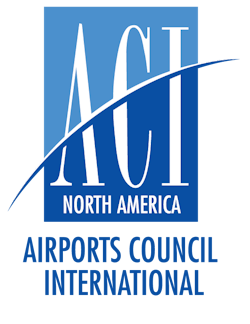How Will 5G Impact Airports? Airport Council Responds to 5 Frequently Asked Questions
As the media continues to monitor the deployment of 5G near airports beginning Jan. 19, ACI-NA is providing input on the most common questions that the organization is receiving from reporters.
ACI-NA has long called for the Biden Administration to delay 5G implementation to ensure a seamless rollout that prevents widespread disruption in air travel. The most recent request was sent to the FAA and the FCC on Jan. 13.
ACI-NA’s Chris Oswald, senior vice president, Safety and Regulatory Affairs responds below.
FREQUENTLY ASKED QUESTIONS (as of Jan. 18, 2022 at 10 p.m. ET)
Why should we delay 5G implementation around airports?
Over the last month, airports have been urging the federal government to intervene and delay deployment of 5G operations across the United States over credible concerns about significant disruptions to passenger and air cargo traffic. In fact, time has already run out and we are beginning to see these disruptions. Major international carriers are already canceling flights and cargo shipments for fear that they won’t be able to safely land their aircraft at U.S. airports because of interference from 5G. Passengers and shippers can expect to see delays, diversions, and cancellations while these outstanding safety issues are resolved.
The health, safety, and security of the traveling public is an airport’s top priority. While we are cautiously optimistic, there are still too many unanswered questions. Today’s positive news from AT&T and Verizon regarding additional 5G mitigation near airports is welcome, but only partially solves this avoidable problem. We will continue to urge the Biden Administration to act immediately to prevent these entirely avoidable disruptions by delaying 5G operations in the vicinity of airports until there are sufficient operational mitigations in place to avoid disastrous disruption to the flying public, shippers, and local communities.
What are airports doing to help this situation?
Airports are doing their best to prepare for the bad hand that we’ve been dealt. We are taking steps to monitor operations and act in the interests of travelers, shippers, and local communities. In the event flight operations are disrupted due to 5G interference, airports will work collaboratively with their airline partners to manage these disruptions, meet the needs of affected passengers, and expedite resumption of normal operations as soon as weather conditions permit.
How did we get to this point? Wasn’t this preventable?
The aviation community has been monitoring the development and deployment of 5G since for years. It has been a major safety concern for us because of potential interference between 5G signals and aircraft instrumentation, specifically the radio altimeters that enable pilots to know precisely how far above the ground they are during low altitude flight. The U.S. government had multiple opportunities over several years to work out reasonable plans for 5G operations. Instead, it chose to ignore repeated credible warnings from the aviation industry about the detrimental impacts these operations would have on the safety, reliability, and integrity of the air transportation system. It failed to act in the interest of millions of Americans that rely on the air transportation system.
What will happen on Jan. 19 when AT&T and Verizon turn on their 5G towers?
As it stands now, almost 90 commercial service airports will lose their low visibility approach capability, the type of approach a pilot would use in the event of rain or fog, on Jan. 19. This capability will be restored gradually as aircraft manufacturers and radio altimeter manufacturers demonstrate they can operate safely in a 5G environment via what the FAA calls “Alternative Methods of Compliance” or AMOCs. During this time, there’s a heightened risk for major air traffic disruptions due to aircraft that don’t qualify for an AMOC aren’t able to land. We’ve already seen several flights and thousands of passengers and tons of cargo affected by 5G-related cancelations today by international air carriers for this reason even before 5G networks are operational.
How long could we see disruptions?
There is still a lot airports don’t know, and that is very troubling considering the deadline is upon us. We are still trying to get information from the FAA regarding additional mitigation strategies that will be deployed at individual airports, but that information has not yet been provided. Based on currently available information we have, resolution of these 5G issues will be lengthy and gradual, taking place over weeks or months. In the meantime, passengers and shippers should expect delays and disruptions until these issues are fully resolved.





